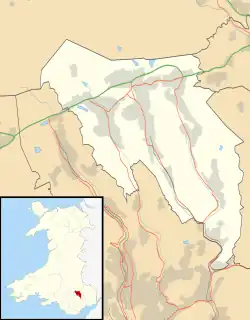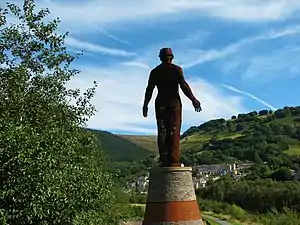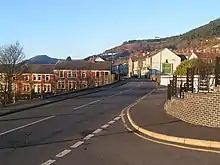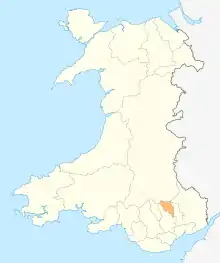Six Bells
| |
|---|---|
 Six Bells and Cwm Nant-y-groes | |
 Six Bells Location within Blaenau Gwent | |
| Population | 4,797 (Llanhilleth) (2011) |
| OS grid reference | SO221032 |
| Community |
|
| Principal area | |
| Preserved county | |
| Country | Wales |
| Sovereign state | United Kingdom |
| Post town | ABERTILLERY |
| Postcode district | NP13 |
| Dialling code | 01495 |
| Police | Gwent |
| Fire | South Wales |
| Ambulance | Welsh |
| UK Parliament | |
| Senedd Cymru – Welsh Parliament | |
Six Bells (Welsh: Chwe Chloch) is an electoral ward and neighbourhood in Abertillery, Blaenau Gwent, Wales. It was originally a village that grew up around the local coal mines. The ward elects two county councillors to Blaenau Gwent County Borough Council.
History and description

The village of Six Bells developed in part of Llanhilleth parish during the mid 19th-century, with the growth of the coal industry in the area. It may have gained its name from the Six Bells public house. Employment would originally have centred around the Hafod Fan pit, which was later replaced by the larger Arael Griffin colliery, which opened in 1898[1] and later became known as Six Bells Colliery. The village was incorporated into Abertillery Urban District and, in the early years of the 20th-century, Alexandra Road and Richmond Road were built which joined Six Bells with Abertillery town to the north.[1] Most of the houses of Six Bells lie immediately east of the River Ebbw.
Six Bells Halt railway station closed in 1962.
Six Bells is the most Easterly Human settlement in Blaenau Gwent.[2]
According to the 2011 census the population of Six Bells was 2,396 (with 198 being able to read, speak or write Welsh).[3]
Six Bells Colliery disaster

On 28 June 1960, 45 men were killed[4] by an explosion at the Six Bells Colliery. On the 50th anniversary a 20 metre high memorial sculpture was unveiled by Rowan Williams, Archbishop of Canterbury on the colliery site. Called Guardian, the monument was described as the Welsh answer to Antony Gormley's Angel of the North.[5] The colliery closed in 1988.[4]
Governance
Six Bells is in the Blaenau Gwent parliamentary constituency for elections to the UK parliament and a constituency of the same name for elections to the Welsh Assembly government.
Town Council
Six Bells is a ward of Abertillery and Llanhilleth Town Council, electing three town councillors.[6]
County Council

The Six Bells county ward elects two county councillors to Blaenau Gwent County Borough Council. It is bordered to the north by Abertillery and to the south by the Llanhilleth ward. To the east is the Abersychan ward of Torfaen.[7]
At the May 2017 elections the ward elected two Independent councillors, Denzil Hancock and Mark Holland.[8] Since 1995 the ward has elected a mixture of Labour, Independent and Plaid Cymru representatives, with Cllr Hancock being elected for Plaid Cymru in 1995 though subsequently standing as an Independent.[9]
| County councillors 1995 – date [9] | ||||||
|---|---|---|---|---|---|---|
| Election | Independent | Labour | Plaid Cymru | |||
| 2017 | 2 | - | - | |||
| 2012 | 1 | 1 | - | |||
| 2008 | 2 | - | - | |||
| 2004 | 1 | 1 | - | |||
| 1999 | 1 | 1 | - | |||
| 1995 | - | 1 | 1 | |||
References
- 1 2 "Six Bells past - Hen Six Bells". Abertillery Online. Retrieved 23 June 2018.
- ↑ https://streetmap.co.uk/map?x=322101&y=203373&z=120&sv=322101,203373&st=4&mapp=map&searchp=ids
- ↑ "Six Bells - Key Stats". UKcensusdata.com. Retrieved 23 June 2018.
- 1 2 "Six Bells Colliery – Pwll Glo Six Bells". Abertillery Online. Retrieved 24 June 2018.
- ↑ Steven Morris (28 June 2010) "Memorial marks Six Bells colliery disaster", theGuardian.com. Retrieved 24 June 2018.
- ↑ Councillors, Abertillery & Llanhilleth Town Council. Retrieved 24 June 2018.
- ↑ Election maps, Ordnance Survey. Retrieved 23 June 2018.
- ↑ Alison Sanders (5 May 2017). "Independents gain back control of traditional Labour heartland Blaenau Gwent". Wales Online. Retrieved 23 June 2018.
- 1 2 "Blaenau Gwent County Borough Council Election Results 1995-2012" (PDF). The Elections Centre. Retrieved 24 June 2018.
